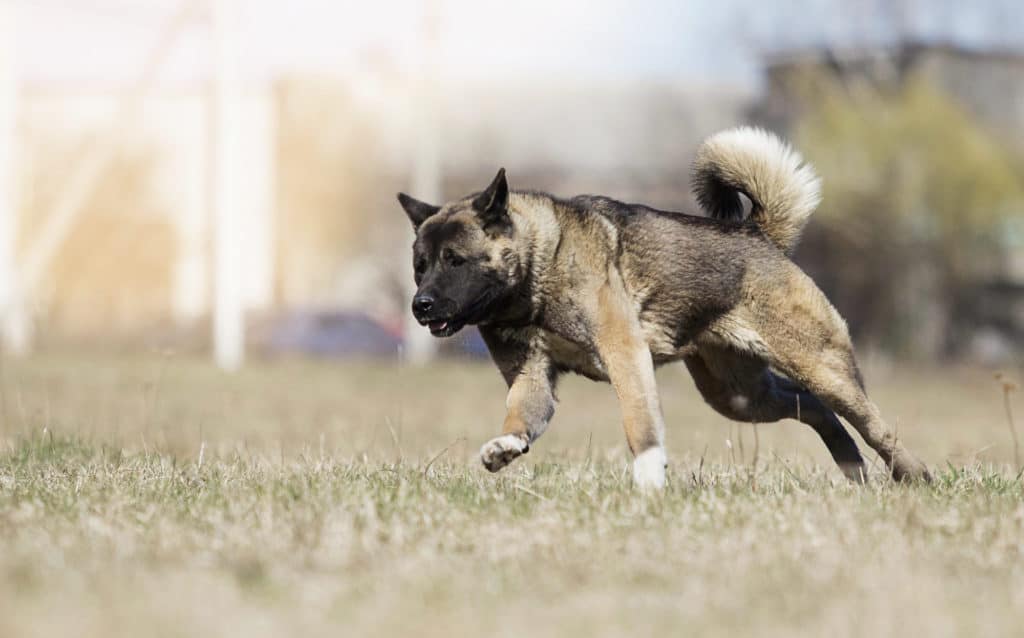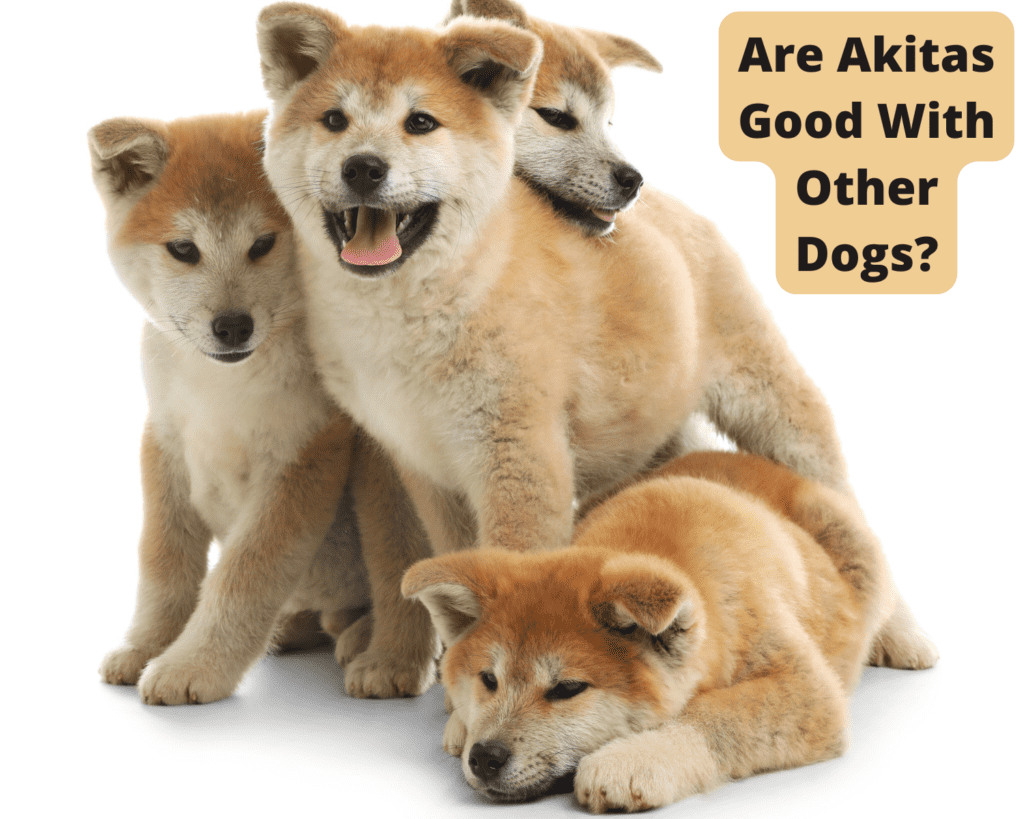Akitas are beautiful dogs and are well-loved by many, but they can be challenging dogs to own. Their unique temperament and dominant personalities are well known for adding a lot of spice and fun to any home.
The loyal large breed makes an awesome companion to humans, but are Akitas good with other dogs? Read on to find out!
Are Akitas Good With Other Dogs?
Akitas are not naturally good with other dogs. Notoriously aggressive, these dogs tend to react negatively to being around other dogs, especially to dogs of the same sex.
Akitas were never bred in groups and, as such, don’t have the instincts necessary to enjoy other dogs’ company.
In addition, an Akita thrives best when they can be the only dog in a home. Training is possible to improve an Akita’s disposition around other dogs, but their guarding instincts and aloofness pose a challenge.
Reasons Why Akitas Can Be Good With Other Dogs
Since most Akitas dislike being around other dogs, you might be surprised when you meet one that works well with other canines!
Since dogs are unique, some dogs of this breed may have a more favorable temperament for getting along with other dogs.
There are some Akitas who just don’t have the same drive for hunting and aggression as others of their breed.
Female Akitas are usually less aggressive than their male counterparts. They have less interest in being dominant among other dogs and may have an easier time becoming accustomed to social activity.
Finally, Akitas are fiercely loyal. If they grow up with another dog or befriend a compatible dog, they might be very loyal to that dog and treat them like family.
This isn’t common, but it’s not entirely impossible, either!
5 Reasons Why Your Akita May Not Be Good With Other Dogs
Individual Akitas have unique personalities and factors that affect their ability to spend time around other dogs.
Here are some plausible reasons that your Akita may dislike dogs:
1. Dominance
Akitas are very dominant dogs. They want to be the “boss” in any given situation. When they’re around other dogs, they have the natural instinct to showcase their dominance so they can become the leader of the pack.
Naturally, many dogs won’t like being treated that way, which worsens the situation!
2. Protective Drive
Akitas are famous for being excellent guard dogs. They’re extremely protective of the people they love, and that protectiveness bleeds into possessiveness.
If they perceive a potential threat to their family members, they might lash out at the threat, even if it’s not a real threat! They might even just chase anyone who dares to approach their loved humans.
3. Fear
Akitas can be skittish and nervous around unfamiliar things that seem scary to them. Bigger or similarly sized dogs can be enough of a reason to send them into panic mode.
4. Hunting Instincts and Prey Drive
Akitas are brilliant hunters. They can register smaller dogs as prey.

It gets even worse if the other dogs start running – Akitas can barely contain the desire to chase down their quarry!
5. Independence
Most Akitas like being on their own. Think of them as strong introverts. They don’t like being in the company of dogs and may even see other dogs as competition.
4 Things You Can Do To Help Your Dog Get Along With Other Dogs
An Akita may never be able to be perfectly well-behaved alongside other dogs, but there are things you can do to encourage more desirable behavior.
Here are some tips:
1. Early Age Socialization
Socialization is a necessary part of all dogs’ growth and development. If you have a young puppy Akita, you must socialize them well. Expose them to other dogs under your watchful eye and allow them to be handled by other humans.
Getting used to being around other dogs may not completely fix an Akita’s natural aggression, but it will help to reduce the tendency later in life.
A capable human should always supervise a social interaction between an Akita and other dogs, regardless.
It’s also a good idea to be somewhat selective about your socialization choices. Don’t bring your Akita around aggressive dogs or dogs that aren’t trained to respect space.
Opt for well-reviewed daycares or set up play dates with dog-owners that you trust!
2. Training
Direct training is the best way to encourage an Akita to get along with other dogs. Start by teaching your dog a simple word designed to get their attention.
If you’ve done any training at all, you already probably have a word like this that you use to direct their attention. “Watch Me” is a common choice!
When you walk outdoors with your Akita and you’re about to pass another dog, watch your dog’s body language.
If they start to tense or show signs of aggression, redirect them with the command word so they look away from the other dog.
In the beginning stages of training, you should also give your dog treats when you use the command word.
This creates a positive association with other dogs. Socialization activities should also involve rewards in this way.
Eventually, a treat won’t be necessary anymore and your Akita will be redirected with just the command!
3. Use A Leash
As a rule, all dogs should be trained to walk on leashes, and you should opt to use a leash whenever possible on excursions.
A leash is extremely important to keep your Akita in check around other dogs.
It ensures that you’re able to control them more easily so you can step in and save the day if things get too stressful.
4. Introduce Them To New Things Often
Akitas can react strongly to new experiences and unfamiliar things, and that includes new dogs.
Make it a habit to introduce your dog to new things regularly so they get more used to those types of experiences. Remember to have treats on hand as rewards for good behavior!
Conclusion
Akitas are complex dogs that can be difficult to own and train. They’re fiercely loyal to their human owners but can be aggressive to strangers and any other dogs.
While some Akitas may coexist with other canines, this is far from common and there are many potential reasons for that.
You can take some steps to help your Akita be more comfortable around other dogs, but mostly, your Akita will prefer to be alone!

